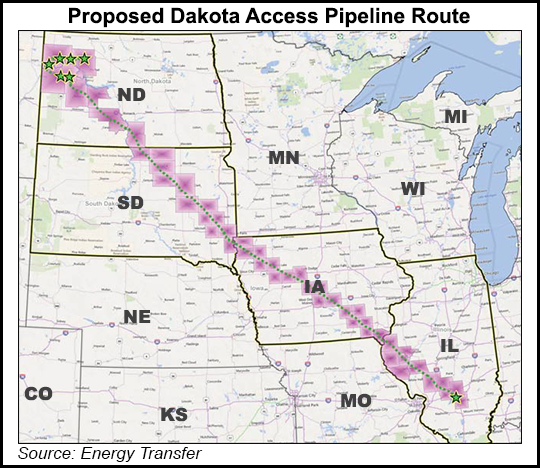Shale Daily | Bakken Shale | E&P | Infrastructure | NGI All News Access | NGI The Weekly Gas Market Report
In Victory for Standing Rock Sioux, New EIS Ordered for Dakota Access Pipeline
A federal judge has reopened the question of whether the Dakota Access Pipeline (DAPL) in North Dakota, which began flowing crude from North Dakota’s Bakken Shale in 2017, will be allowed to continue operating.

In a partial victory for the plaintiffs, the Standing Rock Sioux Tribe, Judge James Boasberg of the U.S. District Court for the District of Columbia on Wednesday ordered the defendants, the U.S. Army Corps of Engineers, to prepare an environmental impact study (EIS) for a section of the pipeline running under the Missouri River.
The Army Corps had previously concluded that granting an easement for the river crossing would yield no significant environmental impact, and therefore did not require an EIS.
The court had upheld this assessment in a previous ruling, saying that the decision not to issue an EIS “largely complied with” the National Environmental Policy Act, or NEPA, a view that the tribe challenged in a motion filed last August.
In the 42-page opinion, Boasberg reversed course, indicating “too many questions remain unanswered” about the Army Corps vetting of the pipeline section in question.
“Unrebutted expert critiques regarding leak-detection systems, operator safety records, adverse conditions, and worst-case discharge mean that the easement approval remains ”highly controversial’ under NEPA,” the judge said.
“As the court thus cannot find that the Corps has adequately discharged its duties under that statute, it will remand the matter to the agency to prepare an environmental impact statement.”
Boasberg did not make a ruling on whether the 570,000 b/d pipeline would be shut down in the interim, instead instructing the parties to file briefs for and against vacating the easement while the new EIS is prepared.
Owned and operated by Dallas-based Energy Transfer Partners LP, the 30-inch diameter DAPL stretches 1,172 miles, linking with the Energy Transfer Crude Oil Co. (Etco) pipeline in southern Illinois, which in turn flows to the Gulf Coast.
Wednesday’s decision “validates everything the tribe has been saying all along about the risk of oil spills to the people of Standing Rock,” said attorney Jan Hasselman with the Earthjustice environmental group representing the tribe. “The Obama administration had it right when it moved to deny the permits in 2016, and this is the second time the court has ruled that the government ran afoul of environmental laws when it permitted this pipeline. We will continue to see this through until DAPL has finally been shut down.”
Calling the ruling “a significant legal win,” Standing Rock Sioux Tribe Chairman Mike Faith said, “It’s humbling to see how actions we took four years ago to defend our ancestral homeland continue to inspire national conversations about how our choices ultimately affect this planet.”
Spokesperson Craig Stevens for the Grow America’s Infrastructure Now (GAIN) Coalition, said, “This is a stunning decision that flies in the face of decades of widely accepted practice.”
DAPL, he said, is “already the most studied, regulated and litigated pipeline in the history of our country and has been safely operating for nearly three years. These companies that invest and support large scale infrastructure projects want certainty from the government; and those who built and now operate the pipeline followed every applicable local, state, and federal rule — but now a court is putting their work in potential peril.
“Not only does this decision risk one company’s investment, but it could also jeopardize our nation’s economic and energy security moving forward.”
© 2024 Natural Gas Intelligence. All rights reserved.
ISSN © 2577-9877 | ISSN © 1532-1266 | ISSN © 2158-8023 |
